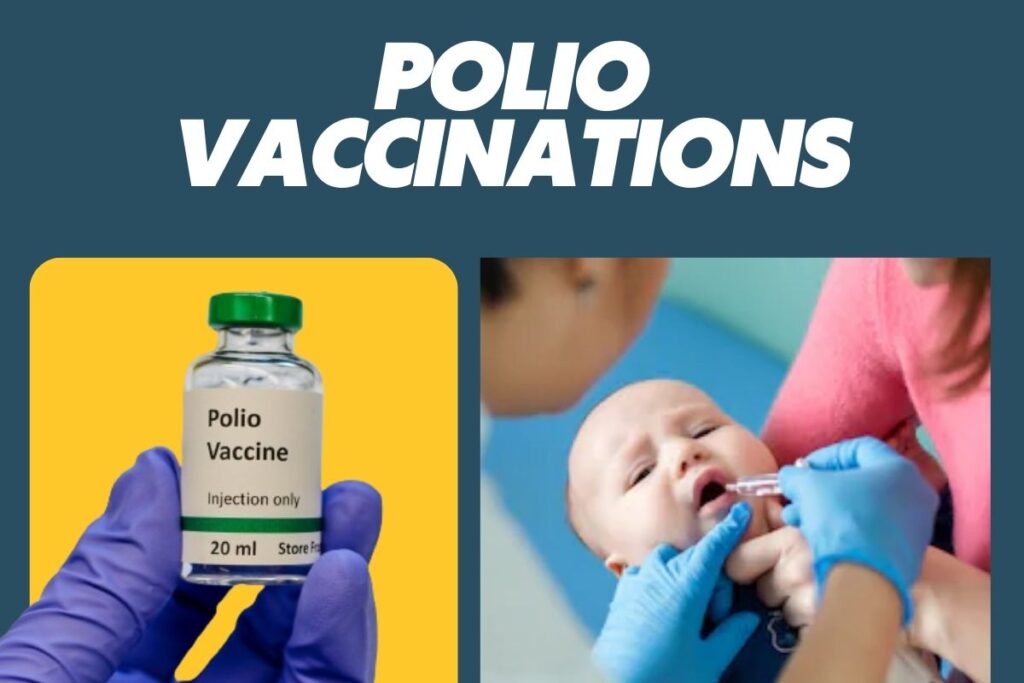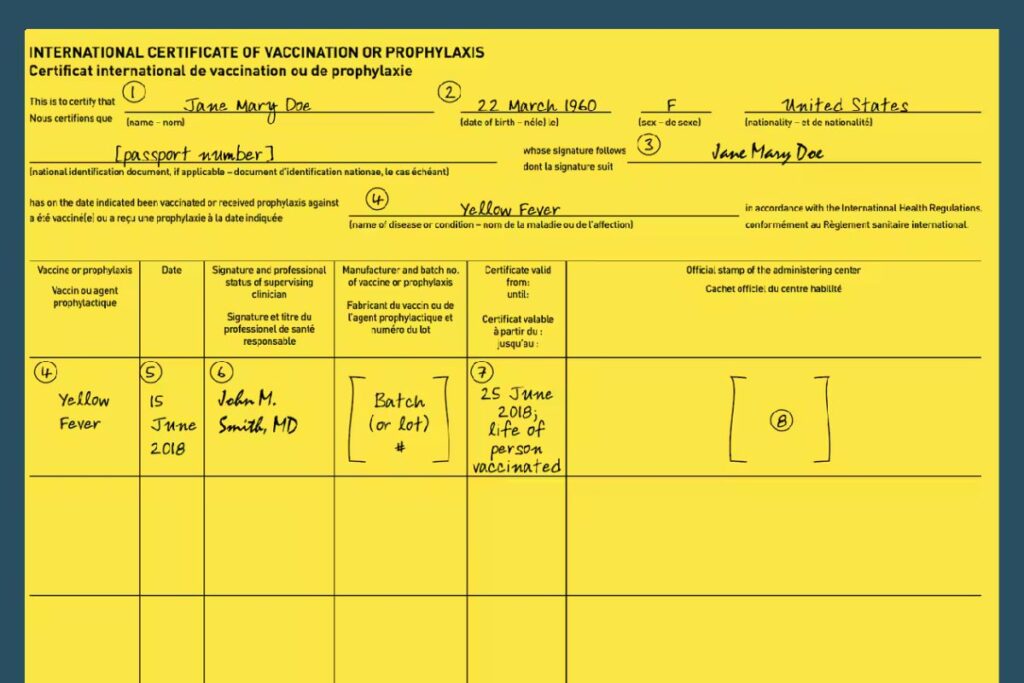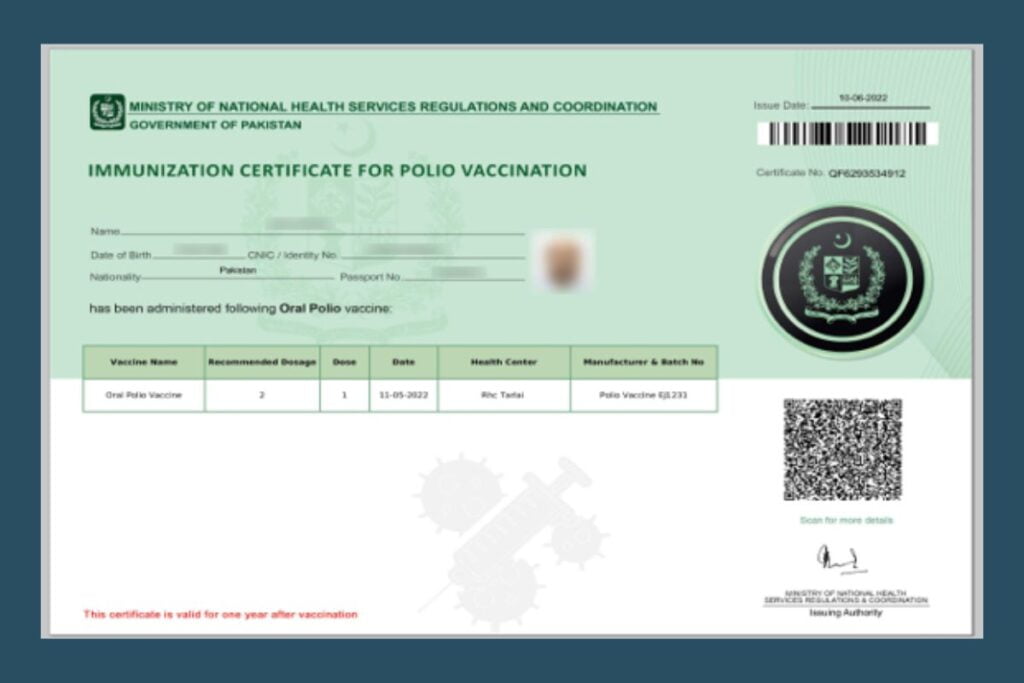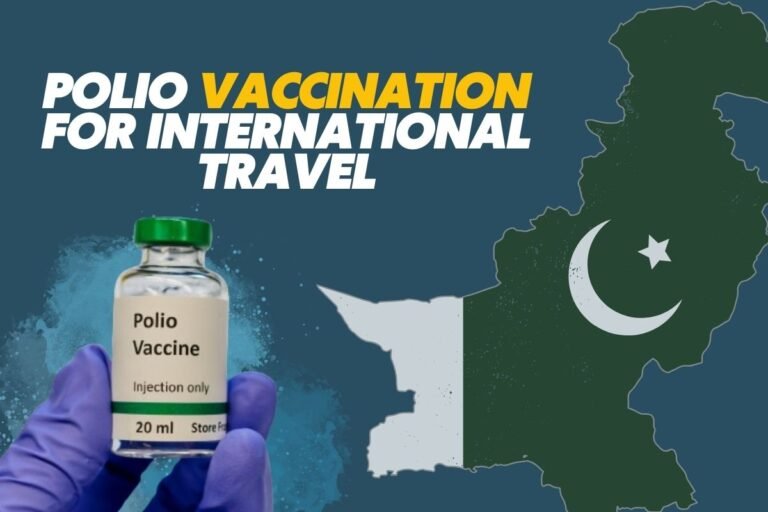Polio Vaccination for International Travel From Pakistan:
Polio, a weakening & deadly infectious disease, has been a significant global health concern. For travelers from Pakistan, polio vaccination is not just a recommendation; it’s a must (mandatory). Since polio is a chronic problem in Pakistan, it is crucial to prevent the spread of this virus through travelers. Below we’ll explore everything you need to know about polio vaccination for international travel from Pakistan.
What is Polio?
Polio (poliomyelitis) is a disease that is caused by the poliovirus. It is most common in children but can also occur in people of other ages. Often it is communicable through direct contact with an infected person and can also be through contaminated water or food sources. Once this virus enters the human body, it can affect the nervous tissues and lead to paralysis or death.
Symptoms of Polio:
Most of the people that are infected with poliovirus don’t show any symptoms. However, 25 % show symptoms such as fever, sore throat, headache, vomiting, fatigue, and muscle stiffness. If the virus transmits to the brain and spinal cord it leads to paralysis, and it can be permanent. Polio can cause severe health issues that may be fatal and thus polio vaccination is very necessary.

Polio in Pakistan:
Historical Background:
Pakistan has been among the countries that are still reporting cases of wild poliovirus transmission. Despite global efforts to eradicate polio, Pakistan continues to report cases, primarily due to challenges such as political instability, logistical hurdles, and public reluctance.
Current Polio Status:
Pakistan has fairly lowered polio cases in the past few years through campaigns of polio vaccinations across the country. Still, it is one of the few countries that experiences the constant spread of polio that requires strict vaccination concerning travelers.
Efforts to Eradicate Polio:
The Pakistani government, along with international organizations like the WHO and UNICEF, has been working to get rid of polio. These efforts include mass immunization drives, awareness campaigns, and improving access to vaccines in remote areas.
Why Polio Vaccination is Necessary for Travelers:
International Health Regulations (IHR):
The World Health Organization (WHO) has issued temporary recommendations under the International Health Regulations (IHR) to prevent the international spread of poliovirus. These include mandatory polio vaccination for travelers from countries with active poliovirus transmission, such as Pakistan.
Risks of Non-Vaccination:
As Pakistan is still facing polio cases, therefore, travelers from Pakistan are a threat to spreading polio to such regions that have not reported this disease. This can lead to epidemics and can be risky for the people of that region.
Protecting Global Health:
Vaccination is the most effective way to prevent polio transmission. By ensuring travelers are vaccinated, we protect not only individual health but also global public health.
Requirements for International Travel From Pakistan:
Polio Vaccination:
Every person who is planning to travel from Pakistan to any country must take the dose of the Oral Polio Vaccine or the Inactivated Polio Vaccine, at least four weeks before traveling.
Types of Vaccines:
- Oral Polio Vaccine (OPV): Orally administered, OPV is very efficient and used in mass immunization campaigns.
- Inactivated Polio Vaccine (IPV): Administered via injection, IPV is often used in countries that are polio-free as it does not carry the risk of vaccine-derived poliovirus.
Vaccination Certificate:
The vaccine should be reported on an International Certificate of Vaccination or Prophylaxis (ICVP). Or download the digital certificate from the NADRA website or Pak vaccination pass. Such certificates are valid for one year from the date of vaccination. This certificate ensures that the vaccinated person is protected against polio during this period (one year).
Points to be noted: That digital certificate might be enough for international travel but some countries require an ICPV certificate. So make sure that you check your destination country’s requirements for vaccination certificates.
How to Get Vaccinated:
Locations for Vaccination in Pakistan:
Polio vaccines are available at various government health facilities, hospitals, and approved travel clinics in Pakistan. Major cities like Karachi, Lahore, and Islamabad have multiple centers where travelers can get vaccinated.
Special Airport Vaccination Counters:
For those who plan their trip at the last moment, special polio vaccination counters are set up at major international airports in Pakistan. These counters provide vaccination services and issue the ICVP on-site.
Vaccination fee:
Polio vaccination is typically provided free of charge at government health facilities. However, private clinics and hospitals may charge a fee.
International Certificate of Vaccination or Prophylaxis (ICVP):
The International Certificate of Vaccination or Prophylaxis (ICVP) is an official document that records vaccinations required for international travel. It is valid internationally and is considered as a proof of vaccination against various illnesses such as polio.
Some government departments that might be able to help you get an ICVP in Pakistan are:
- Ministry of Health
- Directorate General of Health Services
- Provincial Departments of Health
After receiving the polio vaccine, travelers must ensure that the ICVP is properly filled out and signed by the health official. The traveler should carry that certificate along with him, during his journey as it might be required at immigration checkpoints. Must research your destination country’s requirements before traveling.

How do I get a digital certificate for polio vaccination for international travel from Pakistan?
Firstly get vaccinated and then visit the National Database and Registration Authority (NADRA) e-Vaccination portal: https://nims.nadra.gov.pk/nims/. Enter your ID card details etc and pay the fee of RS 100 using a debit/credit card or eSahulat franchise and then download your certificate.
Or download the Pak Vaccination Pass App instead of visiting the NADRA website and follow the same procedure.

Blog’s Summary:
Polio vaccination is very necessary for travelers traveling from Pakistan. Travelers are required to be vaccinated at least 4 weeks before their journey. After vaccination, the traveler should get an ICPV (widely accepted). Travelers must carry their ICPV (International Certificate of Vaccination or Prophylaxis) along with them during the journey. Keep in mind that ICPV is valid for one year only from the date of vaccination.
You can also get a digital certificate for international travel from Pakistan through the NADRA website or Pak Vaccination Pass (not widely accepted). Several countries require polio vaccination proof from Pakistani Travelers such as India, Indonesia, and Saudi Arabia, among others. Always research the specific entry requirements of your destination country in advance.
Frequently Asked Questions:
What if I Lose My ICVP?
If you lose your ICVP, visit the health facility where you were vaccinated. They would have records of your vaccination and can issue a replacement certificate.
Is there a specific time frame for getting vaccinated before travel?
Travelers are required to be vaccinated at least four weeks prior to the travel date. This allows sufficient time for the vaccine to take effect and provides optimal protection against polio.
Can Children Travel Without Vaccination?
No, children also must be vaccinated and have a valid ICVP to travel internationally from Pakistan.
Are There Side Effects of the Vaccine?
Most people experience no side effects from the polio vaccine. However, some may experience mild side effects like pain at the injection site or a mild fever.
What Happens if I Miss the Vaccination Timeline?
If you miss the vaccination timeline, get vaccinated as soon as possible and consult with travel authorities. You may need to adjust your travel plans accordingly.
How Can I Verify My Vaccination Status?
You can verify your vaccination status by checking your ICVP or contacting the health facility where you were vaccinated. They can provide confirmation and additional documentation if needed.






